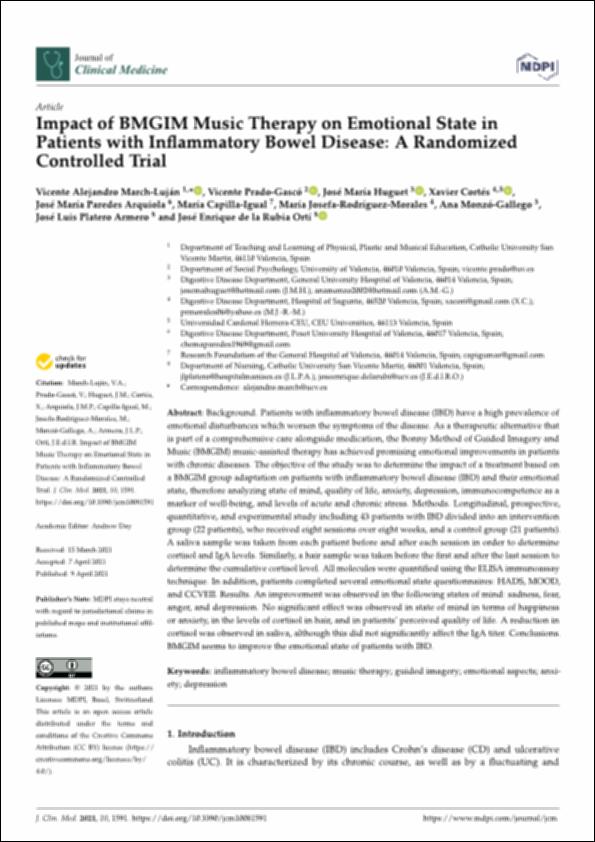Por favor, use este identificador para citar o enlazar este ítem:
http://hdl.handle.net/10637/13668Impact of BMGIM music therapy on emotional state in patients with inflammatory bowel disease : a randomized controlled trial
| Título : | Impact of BMGIM music therapy on emotional state in patients with inflammatory bowel disease : a randomized controlled trial |
| Autor : | March Luján, Vicente Alejandro Prado Gascó, Vicente Javier Huguet Malavés, José María Cortés Rizo, Xavier Paredes Arquiola, José María Capilla Igual, María |
| Materias: | Music therapy.; Intestinos - Enfermedades - Tratamiento.; Intestines - Diseases - Treatment.; Musicoterapia. |
| Editorial : | MDPI |
| Citación : | March-Luján, V.A., Prado-Gascó, V., Huguet, J.M., Cortés, X., Arquiola, J., Capilla-Igual, M. et al. (2021). Impact of BMGIM music therapy on emotional state in patients with inflammatory bowel disease: a randomized controlled trial. Journal of Clinical Medicine, vol. 10, i. 8 (09 apr.), art. 1591. DOI: https://doi.org/10.3390/jcm10081591 |
| Resumen : | Background. Patients with inflammatory bowel disease (IBD) have a high prevalence of emotional disturbances which worsen the symptoms of the disease. As a therapeutic alternative that is part of a comprehensive care alongside medication, the Bonny Method of Guided Imagery and Music (BMGIM) music-assisted therapy has achieved promising emotional improvements in patients with chronic diseases. The objective of the study was to determine the impact of a treatment based on a BMGIM group adaptation on patients with inflammatory bowel disease (IBD) and their emotional state, therefore analyzing state of mind, quality of life, anxiety, depression, immunocompetence as a marker of well-being, and levels of acute and chronic stress. Methods. Longitudinal, prospective, quantitative, and experimental study including 43 patients with IBD divided into an intervention group (22 patients), who received eight sessions over eight weeks, and a control group (21 patients). A saliva sample was taken from each patient before and after each session in order to determine cortisol and IgA levels. Similarly, a hair sample was taken before the first and after the last session to determine the cumulative cortisol level. All molecules were quantified using the ELISA immunoassay technique. In addition, patients completed several emotional state questionnaires: HADS, MOOD, and CCVEII. Results. An improvement was observed in the following states of mind: sadness, fear, anger, and depression. No significant effect was observed in state of mind in terms of happiness or anxiety, in the levels of cortisol in hair, and in patients’ perceived quality of life. A reduction in cortisol was observed in saliva, although this did not significantly affect the IgA titer. Conclusions. BMGIM seems to improve the emotional state of patients with IBD. |
| Descripción : | Este artículo se encuentra disponible en la siguiente URL: https://www.mdpi.com/2077-0383/10/8/1591 En este artículo de investigación también participan: María Josefa-Rodríguez-Morales, Ana Monzó-Gallego, José Luis Platero Armero y José Enrique de la Rubia Ortí. Este artículo pertenece al número especial "Novel Insight into the Diagnosis and Management of Crohn?s Disease". |
| URI : | http://hdl.handle.net/10637/13668 |
| Derechos: | http://creativecommons.org/licenses/by/4.0/deed.es |
| ISSN : | 2077-0383 (Electrónico) |
| Fecha de publicación : | 9-abr-2021 |
| Centro : | Universidad Cardenal Herrera-CEU |
| Aparece en las colecciones: | Dpto. Medicina y Cirugía |
Los ítems de DSpace están protegidos por copyright, con todos los derechos reservados, a menos que se indique lo contrario.


